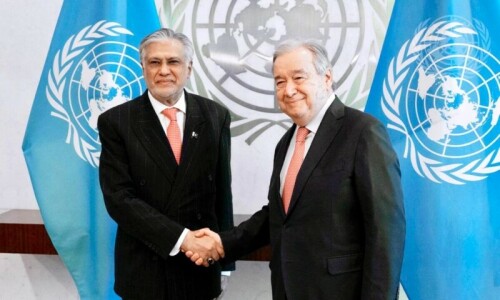PESHAWAR: The Peshawar High Court (PHC) on Tuesday declared several provisions of the Fata Interim Governance Regulation, 2018, including assigning of judicial powers to administrative officers in the tribal districts being merged with Khyber Pakhtunkhwa province, in conflict with the Constitution.
In a short order pronounced by a two-member PHC bench, headed by Chief Justice Waqar Ahmad Seth and also comprising Justice Mussarat Hilali, the federal and Khyber Pakhtunkhwa governments were directed to make alternative arrangements in accordance with the Constitution within 30 days.
The bench accepted a writ petition filed by Advocate Ali Azim Afridi, who had challenged the Fata Interim Governance Regulation, 2018, on multiple grounds and had requested the court to declare the same unconstitutional.
Directs federal, KP governments to make alternative arrangements within a month
The court pronounced the order after the petitioner and the counsel for the federal and KP governments concluded their arguments.
A detailed judgement will be issued later.
The petitioner earlier argued that the interim governance law was in conflict with Article 175 of the Constitution, which guaranteed separation of the judiciary from the executive.
According to the petitioner, the permission granted to commissioners to act as judges, formation of a council of elders to decide civil and criminal matters, constitution of a qaumi jirga, modification of some chapters of the code of criminal procedure and inclusion of the Third Schedule in the regulation through which judicial powers were assigned to administrative officers violated the Constitution.
The petitioner had implicated the federation through law secretary; the president through his principal secretary; state and frontier region ministry through its secretary, KP government through law secretary, and secretary of the home and tribal affairs department as respondents in the case.
Then president Mamnoon Hussain had promulgated the impugned notification on May 25, which was notified in the Official Gazette on May 29.
The regulation also caused repeal of the colonial-era Frontier Crimes Regulation (FCR).
Mr Afridi said the impugned regulation mentioned that agencies in Fata were declared tribal districts and tehsil and frontier regions subdivisions, while nomenclature of political agent was changed to deputy commissioner, additional political agent to additional commissioner and assistant political agent to assistant deputy commissioner.
He said all those administrative officers had been empowered to act as judges in their respective capacity.
In sheer disregard to the law, the petitioner argued, the deputy commissioner had been allowed to constitute a council of elders for settling disputes of civil nature, while a likeminded individual called a ‘judge’ was allowed to form a council of elders for deciding disputes of criminal nature.
He said the interim governance regulation provided for the executive to be considered part of the judiciary, which was against Article 175(3) of the Constitution. He argued that following the passage of the Constitution (Twenty-fifth Amendment) Act, 2018, through which tribal areas were merged with the KP, the government continued to operate under the impugned regulation instead of regular laws, which was illegal.
The petitioner recalled that the federal and provincial government representatives had given undertakings before the Supreme Court that after Fata’s merger with KP all federal and provincial laws would be applicable to the tribal districts.
In their response, the federal and KP governments had pointed out that there was a legal vacuum due to the repeal of FCR and the interim governance regulation was introduced for an interim period and not as a permanent law.
The additional advocate general told the court that the KP government had committed before the Supreme Court that all laws in practice in the province and rest of the country would be made applicable to the tribal districts of former Fata within 30 days.
Published in Dawn, October 31st, 2018















































